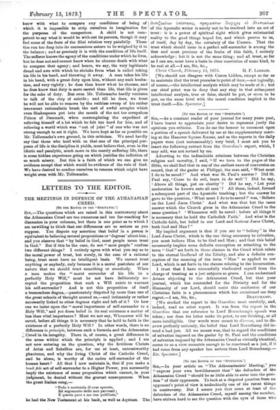[TO THE EDITOR OF THE " SPEOTATOR.1
Sre,—As a constant reader of your journal for many years past, I have learnt to appreciate your desire to represent justly the opinions you criticise. You do me the honour to comment upon a portion of a speech delivered by me at the supplementary meet- ing at the Hanover Square Rooms, and as the reports in the daily papers were (not unreasonably) very brief, I must ask you to insert the following extract from the Guardian's report, which, I may add, was not revised by me.
Adverting to the indissoluble relations between the Christian religion and morality, I said, "If we turn to the pages of the Bible, we shall find that in one of the earliest cases of conversion on record, that of the gaoler at Philippi, the man said, What must I do to be saved?' And what was St. Paul's answer ? Did St. Paul say, Cease to do evil, learn to do well '? Did he say, Above all things, put on charity '? Did he say, Let your moderation be known unto all men ' ? All these, indeed, formed a subsequent part of the Apostolic teaching ; but the answer he gave to the question, 'What must I do to be saved ?' was, Believe on the Lord Jesus Christ.' And what was that but the same answer which the Church gives in the Athanasian Creed to the
same question ? Whosoever will be saved : before all things it is necessary that he hold the Catholick Faith.' And what is the Catholic faith, but belief in our Lord and Saviour Jesus Christ, both God and Man?"
My implied argument is that if you are to " believe " in the Lord Jesus Christ, which is the one thing necessary to salvation, you must believe Him to be God and Man ; and that this belief necessarily implies some definite conception as attaching to the term "God" set forth in those clauses in the Creed which relate to the eternal Godhead of the Trinity, and also a definite con- ception of the meaning of the term " Man " as applied to our Lord, which is set forth in the clauses relating to the Incarnation.
I trust that I have successfully vindicated myself from the charge of treating as a jest subjects so grave. I can understand Arians objecting to the Athanasian Creed, but that your journal, which has contended for the Divinity and for the Humanity of our Lord, should resist this confession of our Christian faith is a phenomenon which has occasioned me deep [We studied the report in the Guardian most carefully, and, indeed, read no other report. It was from the report in the Guardian that our reference to Lord Beauchatnp's speech was taken ; nor does his letter make its point, to our thinking, at all more intelligible. Our words were meant to disavow, and to dis- avow perfectly seriously, the belief that Lord Beauchamp did in- tend a bad jest. All we meant was, that to regard the conditions of salvation imposed on the gaoler by St. Paul and the conditions of salvation imposed by the Athanasian Creed as virtually identical, seems to us a view eccentric enough to be construed as a jest, if it had come from any speaker leas serious than Lord Beauchamp. - ED. Spectator.]


































 Previous page
Previous page